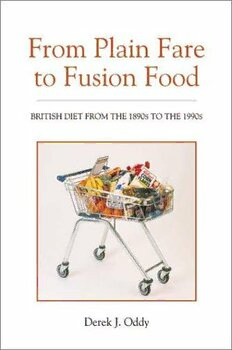
From Plain Fare to Fusion Food: British Diet from the 1890s to the 1990s PDF
284 Pages·2003·2.345 MB·English
Most books are stored in the elastic cloud where traffic is expensive. For this reason, we have a limit on daily download.
Preview From Plain Fare to Fusion Food: British Diet from the 1890s to the 1990s
Description:
Simple meals made from a limited range of industrially processed foodstuffs constituted the 'plain fare' which most people in Britain ate from the 1890s until after the Second World War. Dietary surveys show that when wages were low and social conditions poor, health was affected and support the view that malnutrition and dietary deficiencies existed during the first half of the twentieth century. Increasing knowledge of essential nutrients such as vitamins brought scientists into conflict with civil servants, particularly during the Great War and the depression of the interwar years.Wars put great strains on Britain's supplies of food, much of which was imported. In the Great War, civilians suffered unjustifiably before food rationing was finally introduced. The widely held view that the science of nutrition informed government policy in the Second World War is shown to be a myth, since dietary inequalities continued and, by the mid-1940s, children's growth was affected.The technological revolution in food processing, which gathered momentum when rationing was finally abolished in the 1950s, led to the growth of supermarkets, frozen foods and fast foods. By the 1990s, many traditional patterns of eating had been replaced by an ethnic and fusion food restaurant culture. It has been accompanied by new concerns over food safety and health issues - heart disease, obesity - and by an 'alternative foods' backlash. The irresistible question is: are we any better off? DEREK J. ODDY is emeritus professor of economic and social history, University of Westminster.
See more
The list of books you might like
Most books are stored in the elastic cloud where traffic is expensive. For this reason, we have a limit on daily download.
